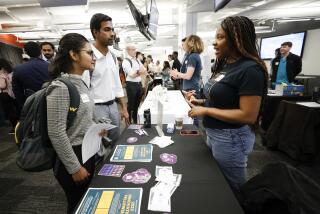Job hunting during the pandemic: Tips for recent graduates
From the dot-com bust in 2000, to the Great Recession and now a global pandemic, Lori Shreve Blake has seen the job market in many forms of disarray. Through each period, the senior director of alumni and student career services at the USC Career Center tells desperate students the same thing:
“At the end of the day, you only need one job.”
For the record:
4:37 p.m. May 27, 2020This article previously referred to M’Chelle Ryan as the associate director of industry relations and experimental learning at the UCLA Career Center. She is the associate director of industry relations and experiential learning.
Finding the right one, especially as the coronavirus outbreak has caused more than 38 million Americans to file for unemployment in the last nine weeks, seems harder than finding yeast at a grocery store. As of May 15, job listings across all industries on Indeed are down 37% since the same time last year, said Paul Wolfe, senior vice president of global human relations for the job search website. That is actually a slight uptick from the mark at the beginning of the month, which was at 39.5%.
It’s a drastic downturn from the job seeker’s market graduates were looking at seven months ago, and it’s competitive. But it’s not impossible, Shreve Blake said.
Here’s what to know about job-hunting during a pandemic.
Be flexible
Just as the pandemic seems to change every day, job seekers must be willing to adapt their mind-set to the times.
“There is still hiring happening,” M’Chelle Ryan, associate director of industry relations and experiential learning at the UCLA Career Center, wrote in an email. “It just may not look exactly how you planned it to.”
Internships may be transitioning to remote work. Be prepared to find, interview for and begin a job virtually instead of in person. Be open to new companies.
Shreve Blake recently introduced a recent graduate looking for jobs in software engineering to Brazen, a company that helps universities transition career fares to a virtual space. The graduate had never heard of the company. Two weeks later, he had a job as a junior software developer.
“Luckily he had his blinders down,” Shreve Blake said. “His mind was open, and now he’s working a great job.”
Follow the money trail
The pandemic didn’t spare any industry from its economic toll, but some are better off than others. Tech companies helping large businesses pivot to working remotely, retail management, delivery work and home healthcare are hiring more than other industries.
Even those who did not anticipate working in one of those industries can benefit if they focus on transferrable skills, Wolfe said. Qualities like time management, organization and being detail-oriented are applicable to many industries, so finding a job where an applicant can display those skills now, even if the position is not directly related to an applicant’s field of study or long-term passion, can only help in the continued dream job hunt once the pandemic clears.
Work your networks
Networking is still a critical part of job hunting, even if coffee meetings now take place online. Take advantage of alumni networks, emailing people in a company or field of interest, namedropping any possible university connections, and requesting a brief informational interview to learn about their role.
“Most people want to help you,” Shreve Blake said. “You’re not asking for a job. If you ask for a job, you’re not going to get a response, but if you ask for information, you’ll get that response.”
Informational interviews don’t even have to be with employees who work in the same department an applicant is targeting, Shreve Blake added. The meetings can still be beneficial to help learn about the culture of a company. If the informational interview goes well, ask if there is anyone else at the company who would be good to speak with. Then repeat the process, trying to move closer to the target department each time.
To upgrade your networking game, move beyond the Zoom meeting and ask for virtual site-visit of a company, Ryan suggested. Ask a mentor to do remote job shadowing. Take advantage of new virtual conferences that usually would be very costly or difficult to attend but have become more accessible.
Look into the light
The most unique modification of the pandemic-era job search is the virtual interview. To ace it, make sure to look straight into the camera lens — not at the screen — while speaking. Looking into the camera as opposed to the screen simulates the eye contact that’s vital during an in-person interview, Wolfe said.
Station yourself in front of a neutral, organized background in good light, Shreve Blake added, and test your audio, video and internet connection. Using friends and family members as practice partners is especially important to get familiar with a new interviewing format. And dressing the part from head to toe is still a must.
Start small
Just because there doesn’t seem to be a full-time job available in an industry of interest doesn’t mean there aren’t opportunities to gain experience in that field. Virtual internships or micro-internships — short-term, paid internships that are often project-based and can last between a week and a month — can add to a resume without an official job or traditional internship. Don’t be afraid of temporary jobs, Shreve Blake said, as they can almost serve as a three-month interview.
“Employers are not going to judge you if you are unemployed during a pandemic,” Hassan Akmal, executive director of the UCLA Career Center said in an email. “However, they are going to focus on what you did during this time. What they want to see is that you are productive and taking your career development seriously.”
More to Read
Inside the business of entertainment
The Wide Shot brings you news, analysis and insights on everything from streaming wars to production — and what it all means for the future.
You may occasionally receive promotional content from the Los Angeles Times.











